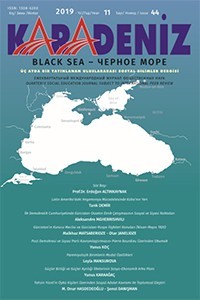TÜRKİYE İKTİSADİ DÜŞÜNCESİNDE MİLLİ İKTİSAT VE KIRSALA BAKIŞLARI
THE CONCEPT OF NATIONAL ECONOMICS AND THE RURAL PERSPECTIVE IN TURKISH ECONOMIC THOUGHT
Author(s): M. Ali SağlamSubject(s): National Economy, Socio-Economic Research
Published by: Kültür Ajans Tanıtım ve Organizasyon
Keywords: National Economy; Rural; Social Inequality; Progress; Feudality; Debt-making;
Summary/Abstract: Since the first half of nineteenth century a new framework had emerged within which the perspectives of Ottoman intellectuals who made inquiries about the world they lived in and including economic thought as well had been gradually settled. While the way of thinking previously carried the traces of the local more explicitly (restoration of the old order) it came under the influence of the modernity conception sets in due course and in an action-reaction relation evolved towards an enlightenment path. The Reform Movement and the emerging reaction of “national school of economy” to it contributed to this evolutionary path and this can not be disregarded. In this context, many intellectuals inside and outside of the discipline writing and thinking about economic life and economic science influenced the evolution of Ottoman economic thought. This study analyses under the larger context of development/progress processes how those intellectuals dealt with economic problems, their breaks and continuities in their thinking, their ideological frameworks by focusing on their views about rural. As a methodology guideline Karl Polanyi’s duality of formalism/essentialism was taken into account and proceeds by choosing a more essentialist poisition. In this context intellectuals’ thinking on rural economic and social structure were problematized. As a result, it was observed that Ottoman intellectuals identified certain themes in their discussions over the rural economic life: social inequality in rural, technological development in agriculture, effciency, the negative impacts of foreign trade on agricultural classes, industrial or rural society. These concept sets and discussion themes were frequently used by the thinkers who were especially influenced by the “national school of economy”. In this context, the views of the leading figures of the national school of economy- Namık Kemal, Ziya Gökalp, Ahmet Mithat Efendi, Akyiğitzade Musa and Parvus Efendi- related with both economics and the rural perspective were tried to be revealed.
Journal: Karadeniz Uluslararası Bilimsel Dergi
- Issue Year: 2019
- Issue No: 44
- Page Range: 252-272
- Page Count: 21
- Language: Turkish

